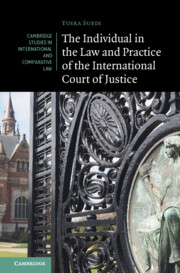Book contents
- The Individual in the Law and Practice of the International Court of Justice
- Cambridge Studies in International and Comparative Law: 192
- The Individual in the Law and Practice of the International Court of Justice
- Copyright page
- Contents
- Foreword
- Acknowledgements
- Table of Cases
- Introduction
- Part I The Individual in the Law of the International Court of Justice
- Part II The Individual in the Practice of the International Court of Justice
- 6 Maritime Disputes
- 7 Territorial Disputes
- 8 Environmental Disputes
- 9 Sources
- 10 Remarks on Practice
- 11 Final Thoughts
- Bibliography
- Index
- Cambridge Studies in International and Comparative Law
7 - Territorial Disputes
from Part II - The Individual in the Practice of the International Court of Justice
Published online by Cambridge University Press: 25 March 2025
- The Individual in the Law and Practice of the International Court of Justice
- Cambridge Studies in International and Comparative Law: 192
- The Individual in the Law and Practice of the International Court of Justice
- Copyright page
- Contents
- Foreword
- Acknowledgements
- Table of Cases
- Introduction
- Part I The Individual in the Law of the International Court of Justice
- Part II The Individual in the Practice of the International Court of Justice
- 6 Maritime Disputes
- 7 Territorial Disputes
- 8 Environmental Disputes
- 9 Sources
- 10 Remarks on Practice
- 11 Final Thoughts
- Bibliography
- Index
- Cambridge Studies in International and Comparative Law
Summary
This chapter argues that the implications of territorial disputes for individuals are seldom considered in the Court’s legal reasoning and proposes ways to do so. It first observes that the Court traditionally resolves territorial disputes with reference to a firm hierarchy of titles, few of which allow for the consideration of individuals. It then considers how the title of effectivités could potentially allow for the consideration of individuals and acknowledges that their rights and needs have been mentioned by the Court as an afterthought in certain judgments. It analyses the reasons for the Court’s approach and argues that the principle of equity could play a stronger role in allowing for the consideration of individuals in territorial disputes.
Keywords
- Type
- Chapter
- Information
- Publisher: Cambridge University PressPrint publication year: 2025

